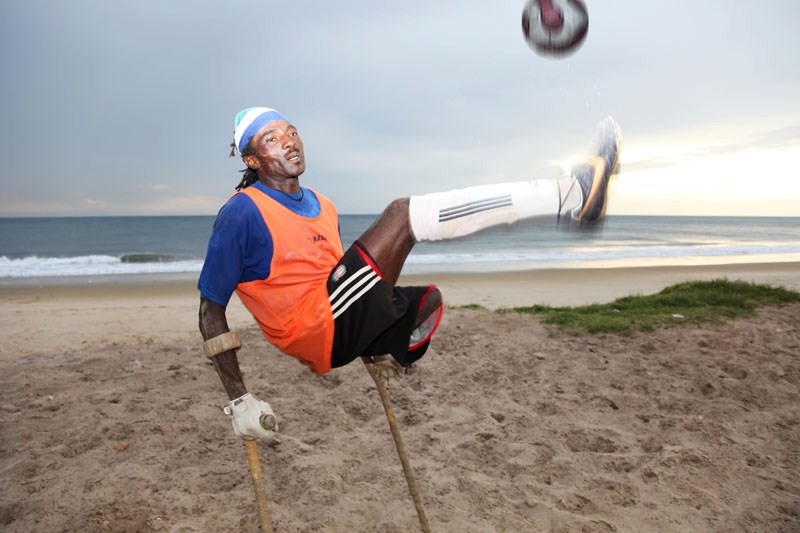The game of soccer doesn't look quite the same when many of the players have only one foot. Still, such games do exist and in the process exemplify the triumph of the human spirit.
So says British filmmaker Lindsay Maggs. She created a documentary, Soccermen, about a team from Sierra Leone that is comprised entirely of survivors from that country's decade-long civil war.
Those 21 men first got together with the help of former St. Albert resident Quentin Ranson. Their team was just one of several humanitarian projects organized by the Hands Across Africa Society, a charity the occupational therapist helped with colleagues from the Glenrose Rehabilitation Hospital.
The tragedy of how the men became amputees is heartbreaking. Rebel soldiers with machetes and guns rampaged across the country starting in 1991. They left 50,000 corpses in their wake by the time the dispute was declared over. Many of those left alive were marked with dismemberment and other physical and psychological injuries.
To give them hope and something to live for is exactly why Ranson invests his energy into people so far away from his home.
"It's extremely satisfying," he explained. "The story of this team is one of the most compelling things that I've witnessed when I was in Sierra Leone."
He helped start up the Single Leg Amputee Sports Club of Sierra Leone in 2001. Each player suffered extreme bodily injury at the hands of the soldiers. One bartered his leg in exchange for a soldier's promise to not rape his mother and sisters. Another had his foot shot off with repeated gunfire and his neck was slashed.
Another, Foday Seaman, was enslaved and shot when he escaped. They left him for dead, only to be saved by a UN peacekeeper. While recuperating in the nation's capital of Freetown, his hospital was attacked and his life was saved once again.
Their stories come to light in this documentary. Maggs first produced a six-minute version of the film with the intention of extending it to more of a full-length feature. Along the way, she encountered much resistance and corporate reluctance to offer support, whether it be financial or in offering broadcast screen time.
She plugged on and now has a 20-minute version that will have its North American debut next Wednesday at the Glenrose. She has followed the team since the 2003 Play4Hope tour in England when the Single Leg Amputee Sports Club of Sierra Leone made its first international appearance. They didn't win their match but all they wanted to do was play anyway.
She has nothing but admiration for the team members.
"[Foday] initially didn't want to give me an interview but he was one of the most compelling athletes on the pitch," she stated. "He played only with one crutch. Foday was very, very fast on the pitch. Very powerful."
Even though she had little to no directing experience, Maggs knew the film had to be made, despite the obstacles.
"In a documentary or film, you've got an antagonist and a protagonist. I thought, 'OK, well the protagonist is the actual football team — rather than the players — and the antagonist is all of the elements going against them."
Inspirational story
Ranson said it's truly inspiring to witness these men kick the ball around.
"The most striking thing about being with the amputee soccer team [was] the first time that they practised on the beach, and cab drivers, street vendors, UN military soldiers all just stopped their cars and stared," he said.
"For the first time, people were not staring at the amputees out of pity or disgust; they were staring with wonder and awe. It is impossible to see these guys move with such agility and confidence and pity them.
"I think it was the first time many of them didn't pity themselves. They had astonishing skill that nobody could deny. When they play, pity is the furthest emotion that people experience."
He called that early experience a "turning point" for him in his mission to help.
"I began to really be able to focus on what these guys could do rather than what they couldn't."
To learn more about the charity, visit www.handsacrossafrica.org.
Preview
Soccermen
Wednesday, March 30 at 12 noon and 7 p.m.
Free admission
Dr. Bill Black Auditorium
Glenrose Rehabilitation Hospital
10230 111 Ave.
Call 780-735-7999 for more information.
All donations will go to the Hands Across Africa Society




